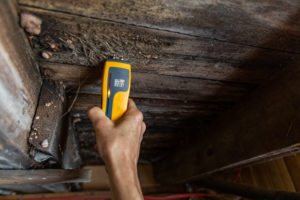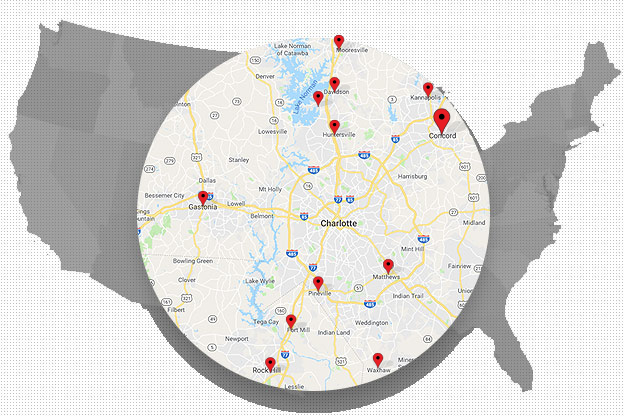7 Reasons You Might Have Water in the Basement

Condensation, wet basement walls, musty smells? Is any of this sounding familiar? If it does, you may have water in your basement.
Water in your basement can lead to damaged walls, floors, destroyed carpets, ruined furniture, and even mold buildup.
Now you’re probably wondering if it is safe to leave things in your basement or if you should move them upstairs?
Read on to learn seven reasons why you may have water in the basement and how you can solve the issue and prevent it from happening again!
Warning Signs of Water in the Basement
To begin, in order to be sure that there is water in your basement, you must be able to identify the warning signs. These signs are not as evident as seeing a puddle on the floor.
Here’s a list of other ways in which water in the basement presents itself:
- Saturated base of concrete walls (a ring of dampness)
- Condensation on the walls and floor
- Water trickling out of the walls
- The odor of mold or mildew
- Stained or blistering walls
- Standing water on the floor
- Deteriorating carpet or wood
Found one or more of these signs? Well, you’ve got water in the basement. Let’s find its source.
Finding the Source
Water in your basement normally comes from one of three sources. These are groundwater, interior moisture sources, and ventilation with humid air.
If the source is rain or groundwater, it means that water outside has now found its way inside your basement. This may be due to a lack of proper grading, downspouts, and gutters.
In some instances, the water, you find in your basement was actually created there. Drying clothes, showering, cooking, and humidifiers are all sources of this water.
In summer or warmer weather, in order to properly ventilate you might crack a window. This lets humid, outside air inside which can condense on basement walls and floor. This can devalue your home significantly.
7 Reasons You Might Have Water in Your Basement
Now that you know that finding the source of the water is important you are now ready to get into the heart of the matter. Let’s look at seven reasons there may be water in your basement.
An Interior Water Leak
When trying to identify the source of water in your basement, begin by checking for inside leaks. Showers, sinks, toilets and bad pipes are all places that can cause leaks. Always find where the water is and check for any leaks in that area.
Fixing a leak is relatively easy. You can do it yourself or contact a plumber. Once the leak is fixed, the water in your basement will be gone for good.
Ineffective Grading
It is important for the ground around your foundation to slope away from your house if it is in the wrong direction because water will accumulate. After accumulating against the foundation, water will gradually make its way into the basement.
To fix this, build up the dirt around the foundation to create a slope going away from your house.
Missing or Defective Gutters and Downspouts
Missing or defective gutters and downspouts will lead to rainwater being directed towards your house’s foundation. This water will eventually accumulate and get inside the basement.
The solution is to clean all gutters regularly. Also, place extenders on all downspouts to disperse water at least 4 feet away from your foundation.
A Cracked Foundation
Water will seep through any cracks in your foundation. Sometimes, it even causes more cracks. A lack of properly connected joists and poor soil drainage also creates cracks.
You should know that solutions will vary according to the cause of the cracks. However, for cracks caused by structural problems, proper footing and connections should be used to seal the gap.
Poor Drain Tile and Sump Pit
Truth be told many homes lack subsurface drainage. In older homes, basements weren’t built with any under the floor drainage system. Even if modern homes have one, they often experience several problems with it.
Building or even fixing a subsurface drainage system is a complex task. Hence, it is best to call in the professionals.
Condensation
When warm, moist air hits your cool basement walls and floor, condensation will happen. However, this is one of the easier basement moisture problems to solve.
If there is a bathroom or kitchen in your basement then use an exhaust fan. Whenever you are taking a shower or cooking turn on the fan to prevent moisture build-up.
Eliminating junk and adding air-conditioning vents are also effective ways to distribute both the moisture and air in your basement properly. Covering areas where condensation normally builds up with insulation will also prevent this problem.
Window Wells
Sometimes window wells will have leaks that cause moisture to build up in your basement. To fix a leak from a window well, simply check if there is a drain outside.
If there is, cleaning it or replacing it should stop the leak. If there is no drain, then go ahead and install one to curb the issue.
Things of the Past
Gone are the days when you had to hurry to preserve those treasured antiques, family heirlooms or that photo album with all the family memories, by carrying them upstairs to safety, because there was water in the basement. There are now several ways professionals can curb this issue.
Having water in your basement can affect your health due to toxic molds. It can also cause serious structural damage to your home and devalue your home. This devaluation will make it harder to sell it should you put it on the market.
If you have water in your basement, act now. The longer the problem remains unattended to, the bigger and more expensive it will be to repair it.
However, the tips presented here offer a sure way to not only fix the problem but prevent it from reoccurring, saving you time, money and reducing stress.
1. What to do if your basement has water in it?
If your basement is experiencing water intrusion, immediate action is necessary to prevent mold, damage, and deterioration. Firstly, identify the source of water in basement, which could be subsurface groundwater or poor exterior drainage. Address hydrostatic pressure by sealing cracks and ensuring proper water flow away from your foundation. Consider installing a basement waterproofing system to manage seepage and safeguard your investment. For comprehensive solutions, seeking professional help can ensure a dry and protected basement environment, enhancing property value and longevity.
2. Why is there water in my basement but no leak?
Water in your basement without an obvious leak often comes from subsurface groundwater due to hydrostatic pressure, or from surface water not draining properly away from your exterior foundation walls. These issues cause water to seep through cracks, where the floor meets walls, or stain foundation walls, indicating improper drainage or groundwater levels pushing water into your basement. Proper waterproofing measures are essential to tackle these common issues. Search for “water in basement repair near me” online and hire experts for assistance.
3. When should I be concerned about water in my basement?
You should be concerned about water in your basement if you notice symptoms like water coming up through the concrete floor, wetness near exterior foundation walls, or your basement flooding, especially during wet weather. These signs indicate problems with surface or subsurface groundwater leading to potential damage.
Taking steps to waterproof your basement and address underlying issues is crucial to prevent mold, damage to walls, floors, and belongings, and ensure a dry and healthy basement environment. If you’re asking yourself, “water in basement but what to do?”, simply contact our experts and we’ll help.
4. What is the most common cause of water in the basement?
The most common causes of water in the basement include surface water not draining away properly and subsurface groundwater issues. This often leads to hydrostatic pressure against the foundation, pushing water through cracks. Key symptoms include water seeping up through the concrete basement floor or accumulating near exterior foundation walls. Properly addressing these issues is crucial to keeping your basement dry and preventing damage. Talk to our professionals who are well versed with water in basement solutions if you need help.
5. Is a little water in basement OK?
Having even a little water in your basement is not okay. Small amounts of water can lead to mold, musty smells, and damage to walls, floors, furniture, and belongings over time. It’s crucial to address any water in the basement promptly to prevent these issues and maintain the integrity of your home. Proper basement waterproofing measures are essential to keep your basement dry and protect your property. Asking yourself, “water in basement but who to call?” Our qualified experts will offer the right assistance for you.
For more tips on fixing the water in your basement, please reach out to us.
Learn more about Sedona Waterproofing Solutions.
Recent Posts
- How Crawl Space Encapsulation Benefits the Environment – An Expert Guide
- 6 Ways Professionals Keep Your Crawl Space in Top Shape
- Structural Repair Solutions for Crawl Spaces, Basements, and Foundations
- Essential Crawl Space Repair Tips Every Homeowner Should Know
- The Importance of Radon Mitigation: Ensuring a Safe Living Environment for Homeowners
Categories
- Basement Mold
- Basement Waterproof Foundation
- Basement Waterproofing
- Crawl Space Dehumidifier
- Crawl Space Encapsulation Cost
- Crawl Space Repair
- Crawl Space Waterproofing
- Encapsulation
- Foundation Repair
- Foundation Waterproofing
- French Drains
- Leaky Basement
- Mold Remediation
- Mold Removal
- Radon
- Slab Jacking
- Sump Pump
- Uncategorized
- Vapor Barrier
- Water Leak
- Waterproofing
- White Mold
Archives
- June 2024
- May 2024
- March 2024
- January 2024
- June 2023
- May 2023
- April 2023
- March 2023
- February 2023
- January 2023
- December 2022
- November 2022
- October 2022
- September 2022
- August 2022
- July 2022
- June 2022
- May 2022
- March 2022
- February 2022
- January 2022
- December 2021
- November 2021
- October 2021
- September 2021
- August 2021
- July 2021
- June 2021
- May 2021
- April 2021
- March 2021
- February 2021
- January 2021
- December 2020
- November 2020
- October 2020
- September 2020
- August 2020
- July 2020
- June 2020
- May 2020
- April 2020
- March 2020
- February 2020
- January 2020
- December 2019
- November 2019
- October 2019
- September 2019
- August 2019
- July 2019
- June 2019
- May 2019

